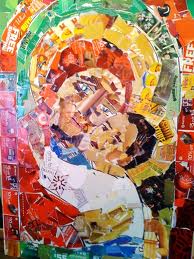|
12/9/2012 Comments The Season of TearsBy: Gregory Williams  In the Church where I was baptized, I was taught that Advent was for those of us who are too depressed to do Christmas. Every year, for these four weeks, we were reminded that one of the spirit’s greatest gifts to a Christian community is that community’s ability to live with weakness, to admit its need for grace, to name the absence of God in our lives in the midst of a culture characterized by triumphalism and willful blindness to pain. One year the pastor demonstrated this quite dramatically in a sermon. “There are many Churches,” he said, “that, in order to accommodate those who mourn the loss of loved ones at Christmas or who cannot be with family for other reasons, hold a “blue Christmas” service.” He then held up his (blue) stole and exclaimed, “we don’t need to do that because we already have a blue Christmas. It’s called Advent!” While I have since moved away from this Church, I believe that its emphasis on periods of mourning and lamentation has political significance, particularly for those of us who integrate anarchist praxis into our path of discipleship. One of the major defensive mechanisms of Imperial Religion is its ability to rob us of our tears. We live amidst an interlocking set of globe-spanning political, social and cultural systems founded upon the colonial dispossession of land and displacement of people, particularly low income people and people of color, making room for the capitalist transfiguration of every person place and thing into a commodity to be marketed, used and thrown away. Our life together in creation is also marred by the heteropatriarchal scripting of gender and sexuality that rests on oppressive dualisms of culture and creation, rationality and affect, mind/spirit and body and male and female. This social system is responsible for the deaths of millions, for historic and ongoing genocide and for the near-constant burning of the bodies of children, women and men upon the fiery altars of imperial war. It is only human to resist these monstrosities. But it is also only human to weep. “One death is a tragedy,” noted Stalin. “A million is a statistic.” Imperial religion has many statistics, but only allows for tragedies that befall the limited circle of those it deems to classify as human. It is not surprising then, that Churches in North America—that is, Churches which have by and large synthesized their Christianity with Imperial Religion—do not, as a rule, do Advent very well. For most, it has become a kind of “pre-Christmas.” Under the guise of defining this season as one of expectation, most bedeck their buildings early, bring out their finest liturgies, hold fundraisers for their flagship charities and put on the finest musical performances they can muster. It is of course not a little suspicious that, by taking the tears out of Advent, the North American Church has managed to extend the Christmas season by almost exactly the same length that the shopping season goes on. We go seamlessly from Advent to the shopping mall and back again, without acknowledging the suffering embodied in both exploitative modes of production and the broken body of Christ. In all this advance expectation of Christmas, what gets lost is that those who most eagerly await a Messiah are, in our tradition, those who are best able to name the absence of God. John’s gospel describes the coming of the Messiah by saying “the light shines in the darkness, but the darkness has not overcome it.” Yet in order for this statement to be meaningful, darkness – the absence of God – has to be named. This is one of Christianity’s most subversive messages amidst a culture that is in deep denial of the reality of social as well as biological death. Coming to grips with death is one of the first steps in a truly revolutionary social praxis. We must be broken of our denial that there is something terribly wrong and that, moreover, we are all, to a greater or lesser extent, complicit in it. I see this need first hand as someone located, simultaneously, in a liberal, wealthy, protestant seminary and in the struggle for migrant justice in a town where over seventy people were deported in four months this past summer under a program instituted by a democratic president. I often feel this disconnect in a seminary culture that glories in its own liberalism while turning a blind eye to the racist, classist structures that are integral to the university it is a part of and to the levels of violence perpetrated by the state and local governments. I recently noted to a friend that, “sometimes I want to take these people by the shoulders, shake them as hard as I can and say, ‘don’t you get how f-ing evil this stuff you’re talking about is?’” Advent might not be a season to take our friends by the shoulders and shake them as hard as we can (something more reminiscent of the cleansing of the temple), but it is a season to name “how f-ing evil this stuff is.” It is a season to name and lament that which the Empire encourages us to ignore. It is indeed a season for those of us who are to depressed for Christmas, as well as those who are too angry, too tired, too alienated or just plain fed up. It is a season to awaken to the fact that we live in the midst of death so that we may pray earnestly for the coming of the Lord of Life. It is only in the midst of this naming of our pain, of the darkness that shrouds our world, that we can truly know what it is to hope. “Hope,” notes William Stringfellow, “is known only in the midst of coping with death. Any so called hope is delusory and false without or apart from the confrontation with the power of death.” Advent must be a season of tears so that we can experience genuine hope. It is no mere coincidence that imperial religion simultaneously denies the suffering of the crucified ones of our world and claims that this suffering is inevitable, necessary or perversely redemptive. “It’s not so bad” and “it has always and will always be this way” go hand in hand while the bodies of children burn, while bodies coded as “illegal” are displaced and deported, while the bodies of workers are broken by twelve hour days worked for subsistence wages, and while the bodies of women and, particularly, of women of color, are coded as rapable. In and through Advent, we name these things for what they are – the reign of death in the structures of empire. In and through Advent, we learn to hope for an alternative – the coming reign of life in the incarnation of Christ. It is time for those of us who are political radicals of all stripes as part of our quest to follow Jesus to recover Advent as a season of mournful longing and expectant hope, deathly realism about the reality of structural sin and life-giving hope for the joy of the reign of God. It is only then that we will be able to pray with true hearts “Amen, come Lord Jesus!”
Comments
|
Disclaimer
The viewpoints expressed in each reader-submitted article are the authors own, and not an “official Jesus Radicals” position. For more on our editorial policies, visit our submissions page. If you want to contact an author or you have questions, suggestions, or concerns, please contact us. CategoriesAll Accountability Advent Anarchism Animal Liberation Anthropocentrism Appropriation Biblical Exegesis Book Reviews Bread Capitalism Catholic Worker Christmas Civilization Community Complicity Confessing Cultural Hegemony Decolonization Direct Action Easter Economics Feminism Heteropatriarchy Immigration Imperialism Intersectionality Jesus Justice Lent Liberation Theology Love Mutual Liberation Nation-state Nonviolence Occupy Othering Pacifisim Peace Pedagogies Of Liberation Police Privilege Property Queer Racism Resistance Resurrection Sexuality Solidarity Speciesism Spiritual Practices Technology Temptation Veganism Violence War What We're Reading On . . . White Supremacy Zionism ContributorsNekeisha Alayna Alexis
Amaryah Armstrong Autumn Brown HH Brownsmith Jarrod Cochran Chelsea Collonge Keith Hebden Ric Hudgens Liza Minno Bloom Jocelyn Perry Eda Ruhiye Uca Joanna Shenk Nichola Torbett Mark VanSteenwyk Gregory Williams Archives
October 2017
|
Search by typing & pressing enter


 RSS Feed
RSS Feed